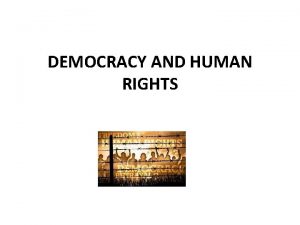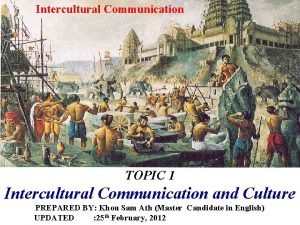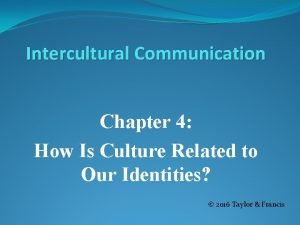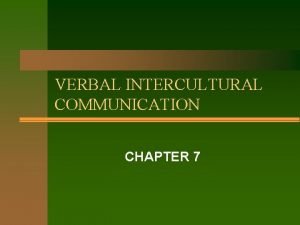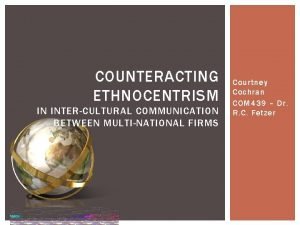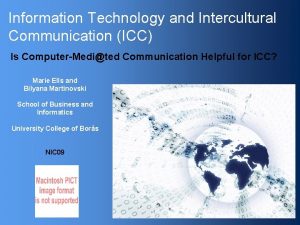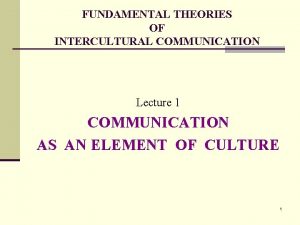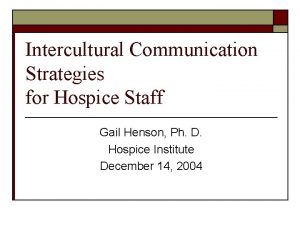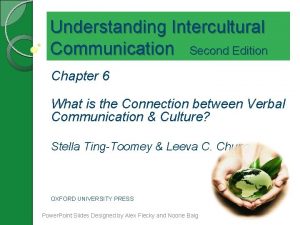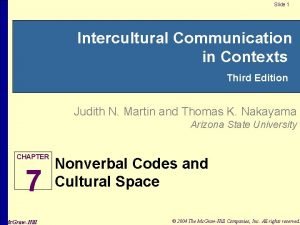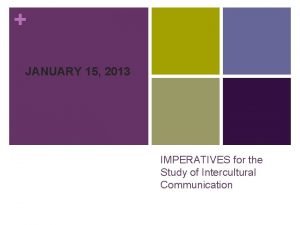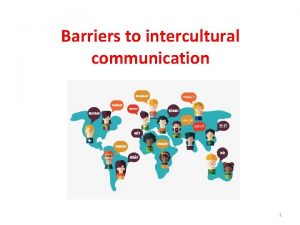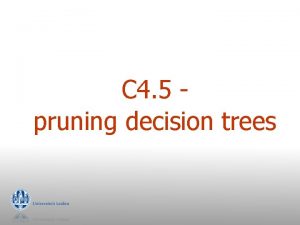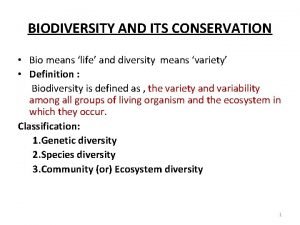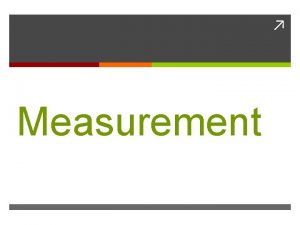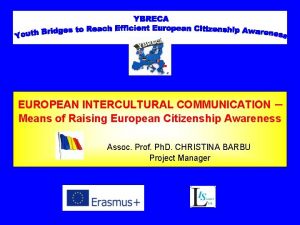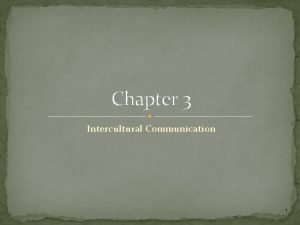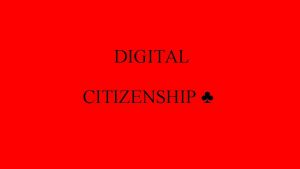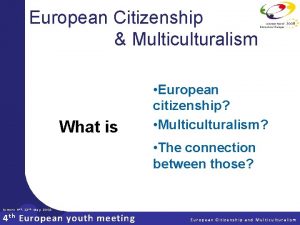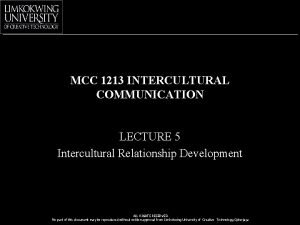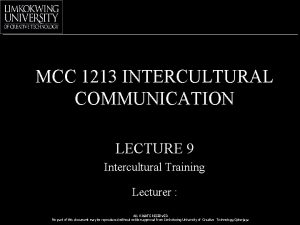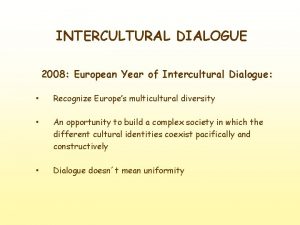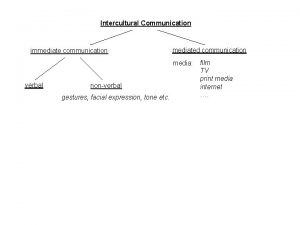EUROPEAN INTERCULTURAL COMMUNICATION Means of Raising European Citizenship





















































- Slides: 53

EUROPEAN INTERCULTURAL COMMUNICATION – Means of Raising European Citizenship Awareness Assoc. Prof. Ph. D. CHRISTINA BARBU Project Manager

KEY CONCEPTS: 1. 2. 3. 4. CITIZENSHIP vs. NATIONALITY INTERCULTURAL COMMUNICATION GLOBALIZATION vs. GLOCALIZATION 5. EUROPEANIZATION 6. ETHICS OF EUROPEAN CITIZENSHIP 2

1. CITIZENSHIP 3

WHAT IS CITIZENSHIP IN YOUR OWN WORDS? ? ? ? CITIZENSHIP – THE CENTRAL CONCEPT OF YBRECA PROJECT 4

Professor Bryan S Turner CITIZENSHIP: Critical Concepts in Sociology CITIZENSHIP is a crossroads concept in social sciences: - juridicial science (the states’ rights and obligations) - political philosophy - culture and communication 5

Professor Bryan S Turner CITIZENSHIP brings up questions relating to FREEDOM, EQUALITY, RIGHTS. CITIZENSHIP defines people’s expectations relating to SOCIAL CONTRACT. 6

Professor Bryan S Turner • Bryan S Turner (British and Australian sociologist) outlines the HISTORY OF CITIZENSHIP and traces its application in various debates within the social sciences Major works: • Turner B. , ”Rights and Virtues. Political Essays on Citizenship and Social Justice”. Oxford: Bardwell Press (2008) • Turner B. , The Routledge International Handbook of Globalization Studies. London: Routledge(2009) • Turner B. , H. Khondker, Globalization East and West, SAGE: London (2010) 7

• There is a General View that: in ANCIENT TIMES CITIZENSHIP embodied a SIMPLER RELATION than the MODERN FORMS, (although this view has been challenged). • Disagreement: when the concept of citizenship began: - Many thinkers point to the early city-states of ANCIENT GREECE-possibly as a reaction to the fear of slavery. - Others call it a MODERN phenomenon - dating back only a few hundred years. 8

- Roman times: citizenship becomes more a relationship based on law (less political than in ancient Greece), still a wider concept (of who was considered a ”citizen”). - Middle Ages in Europe: citizenship was identified with commercial life in the growing cities; considered ”membership in emerging nation-states”. - Modern democracies: citizenship - contrasting concept: - liberal-individualist view (needs, entitlements, legal protections) - civic-republican view (political participation, active relation with specific privileges and obligations). 9

Throughout history • CITIZENSHIP has been connected with: - an ideal status, - freedom, - legal aspects (including rights) - has excluded non-citizens from basic rights and privileges More on: https: //en. wikipedia. org/wiki/History_of_citizenship 10

Jürgen HABERMAS • One of the world's most outstanding sociologists and philosophers (German) • Considerable influence on the EU with his views on - CITIZENSHIP in general - how UNION CITIZENSHIP AND EUROPEAN IDENTITY could be established beyond the boundaries of EU States. 11

Jürgen HABERMAS • Conservatively: citizenship - a national phenomenon - an institution or set of rights situated within the community of the nation state. • In the last two decades: - citizenship progressively turns to non-national forms More on: Nurullah TEKİN ”The Assessment of Habermas’ Concept of Citizenship in the Context of the European Union” 12

Jürgen HABERMAS Major works: • The Structural Transformation of the Public Sphere (1962) • Communication and the Evolution of Society (1976) • Citizenship and national identity: some reflections on the future of Europe (1994) • J. Habermas, The Future of Human Nature (2003) • Old Europe, New Europe, Core Europe (2005) • Europe. The Faltering Project (2009) • The Crisis of the European Union (2012) 13

William K. Dustin Toward an Ethic of Citizenship: Creating a Culture of Democracy for the 21 st Century Contents: • The meaning of CITIZENSHIP • The 3 R’s of Representation - Political Representation - Representation of Citizenship Frontier - Legislative Representation • Education for CITIZENSHIP • Praxis 14

Peter Riesenberg Citizenship in the Western Tradition: Plato to Rousseau Divides the history of CITIZENSHIP into 2 ERAS (before and after the French Revolution): • ERA 1: From Ancient Greek Times till the French Revolution (”gaining civic virtue by active participation in governing”) • ERA 2: From the French Revolution to Modern Times (”civic virtue drained out of citizenship”) 15

References about CITIZENSHIP: • • Bryan S Turner Jürgen HABERMAS William K. Dustin Peter Riesenberg 16

2. CITIZENSHIP vs. NATIONALITY 17

CITIZENSHIP and NATIONALITY are often related, but distinct concepts with different meanings. CITIZENSHIP = a formal (legal) status in a political institution (city/state) Modern times: it includes a set of rights and a set of duties. NATIONALITY = informal membership or identification with a particular nation/social category (not synonym for country/state). Social categories: characterised by at least a common language, culture and territory (sometimes common religious faith or ancestry). 18

3. INTERCULTURAL COMMUNICATION 19

INTERCULTURAL COMMUNICATION = communication between individuals /groups of different linguistic and cultural origins. = complex process (not just an encounter) ? ? Ancient times: INTERCULTURALITY - mainly when the EXPANSION OF AN EMPIRE favoured the contact of several peoples / mentalities / cultures. Modern times: MORE FREQUENT INTERCULTURALITYtravels, global policy of intercultural exchanges 20

"Any culture is born in mixing, in interaction, in confrontation. Conversely, it is in isolation that civilization dies. " (Octavio Paz) Intercultural communication is no longer an OPTION, but a NECESSITY. 21

INTERCULTURAL COMMUNICATION DECISION Today, IMPORTANT DECISIONS in business, politics, education, health, and culture usually effect citizens of MORE THAN ONE NATION. 22

INTERCULTURAL COMMUNICATION LACK OF KNOWLEDGE of another culture can lead to embarrassing or amusing MISTAKES in communication. 23

INTERCULTURALITY enables: • EXPERIMENTATION of new forms (of government, education, production. . . ) • DIVERSITY (new points of view, cross-culture activities. . . ) • Development of JOINT POLICIES (no customs, unique currency –euro, European Parliament for legal decisions, trade agreements. . . ) • Preservation of NATIONAL VALUES circumscribed to the European context • . . 24

INTERCULTURAL MANAGEMENT within the EUROPEAN UNION CONTEXT warning !!! EU communication act, which is NOT IN ACCORDANCE WITH the individual’s/group’s culture can lead to a change of attitude towards EU. Any 25

4. GLOBALISATION vs. GLOCALIZATION 26

GLOBALIZATION + LOCALIZATION = GLOCALIZATION 27

Example of Glocalization 28

MEANINGS for GLOBALIZATION: GLOBALIZATION EUROPEANIZATION INTERNATIONALIZATION UNIVERSALIZATION MONDIALIZATION CROSS-CULTURALIZATION 29

J. J. Arnett (psychologist) believes that now most people in the world develop a BICULTURAL IDENTITY, in which: - part of their identity is rooted in their local culture while - another part is aware of their relation to the global culture. J. J. Arnett: The Psychology of Globalization (2002) 30

• GLOBALIZATION = The worldwide movement toward economic, financial, trade, and communications INTEGRATION. - propagates intercultural communication /integration - enables multicultural and transcultural approach - generates cultural richness and diversity - interdependence - ! threat to other national cultures ! - ex. : Englishization is a means of globalization process 31

• GLOCALIZATION (1980) = co-presence of both UNIVERSALIZING and PARTICULARIZING tendencies. - promotes the richness of cultural diversity - preserves local identities In business: - the adaptation of international products around the particularities of a local culture in which they are sold 32

5. EUROPEANIZATION 33

CITIZENSHIP of the EUROPEAN UNION EU TREATY: ”Every person holding the nationality of a member state shall be a CITIZEN OF THE UNION. Citizenship of the Union shall be additional to and not replace NATIONAL CITIZENSHIP”. 34

• EU legislation - available in all 23 official languages • Schengen Agreement - sense of belonging to a single, unified geographical area 35

• EURO (since 2002) - more than 2/3 Europeans • Involvement in EU decision-making. Every adult EU citizen has the right to vote in European Parliament elections • EU was set up to serve the peoples of Europe, and its future must be shaped by the active involvement of people from all walks of life. • EU’s founding fathers: ”We are not bringing together states, we are uniting people” 36

EUROPEANIZATION = The process in which a non-European subject adopts a number of European features (Westernization). • EU policy <-> NATIONAL policy EU political and economic dynamics become part of the organisational logic of NATIONAL politics and economics. 37

6. ETHICS of EUROPEAN CITIZENSHIP 38

Members of EU ”CULTURAL AMBASSADORS” 39

EUROPEAN CITIZENSHIP: OPPORTUNITIES and DUTIES 40

EUROPEAN CITIZENSHIP 6 FUNDAMENTAL RIGHTS: • • • Dignity Freedoms Equality Solidarity Citizens’ rights Justice 41

1. DIGNITY • Human dignity. • Right to life. • Right to the integrity of the person. • Prohibition of torture and inhuman or degrading treatment or punishment. • Prohibition of slavery and forced labour. 42

2. FREEDOMS • Right to liberty and security. • Respect for private and family life. • Protection of personal data. • Right to marry and right to found a family. • Freedom of thought, conscience and religion. • Freedom of expression and information. • Freedom of assembly and of association. • Freedom of the arts and sciences. • Right to education. • Freedom to choose an occupation and right to engage in work. • Freedom to conduct a business. • Right to property. • Right to asylum. • Protection in the event of removal, expulsion or extradiction. 43

3. EQUALITY • Equality before the law. • Non-discrimination. • Cultural, religious and linguistic diversity. • Equality between men and women. • The rights of the child. • The rights of the elderly. • Integration of persons with disabilities. 44

4. SOLIDARITY • Workers' right to information and consultation within the undertaking. • Right of collective bargaining and action. • Right of access to placement services. • Protection in the event of unjustified dismissal. • Fair and just working conditions. • Prohibition of child labour and protection of young people at work. • Family and professional life. • Social security and social assistance. • Health care. • Access to services of general economic interest. • Environmental protection. • Consumer protection. 45

5. CITIZENS' RIGHTS • Right to vote and to stand as a candidate at elections to the European Parliament. • Right to vote and to stand as a candidate at municipal elections. • Right to good administration. • Right of access to documents. • Ombudsman. • Right to petition. • Freedom of movement and of residence. • Diplomatic and consular protection. 46

6. JUSTICE • Right to an effective remedy and to a fair trial. • Presumption of innocence and right of defence. • Principles of legality and proportionality of criminal offences and penalties. • Right not to be tried or punished twice in criminal proceedings for the same criminal offence. 47

EUROPEAN CITIZENSHIP RIGHTS Ø Travel Ø Education Ø Health care Ø Live and Work Ø Vote Ø Put forward legislative proposals 48

EUROPEAN CITIZENSHIP DUTIES Ø implement the principle of EQUAL TREATMENT irrespective of racial or ethnic origin, religion or belief, disability, age or sexual orientation Ø provide EQUAL ACCESS to employment, selection criteria and recruitment conditions, vocational guidance and training Ø ensure job classification systems to determine PAY ON THE SAME CRITERIA regardless of racial or ethnic origin, religion or belief, disability, age or sexual orientation 49

EUROPEAN CITIZENSHIP AWARENESS 50

? ? ? Write on a piece of paper one of the answers that suits you best: • OFTEN • SOMETIMES • NEVER 51

52

Efharisto ler r ü k k e Teş 53
 Responsible citizenship means
Responsible citizenship means Discrimination in intercultural communication
Discrimination in intercultural communication Example of a low context culture
Example of a low context culture Intercultural communication questions
Intercultural communication questions Avowal and ascription
Avowal and ascription Youtube intercultural communication
Youtube intercultural communication Intercultural communication notes
Intercultural communication notes Staircase model of intercultural communication
Staircase model of intercultural communication Verbal intercultural communication
Verbal intercultural communication Nonverbal communication codes
Nonverbal communication codes Intercultural communication conclusion
Intercultural communication conclusion Ethnocentrism intercultural communication
Ethnocentrism intercultural communication Intercultural communication model
Intercultural communication model Technology and intercultural communication
Technology and intercultural communication Theories of intercultural communication
Theories of intercultural communication Strategies for improving intercultural communication
Strategies for improving intercultural communication Understanding intercultural communication 2nd edition
Understanding intercultural communication 2nd edition Intercultural communication in contexts
Intercultural communication in contexts Demographic imperative intercultural communication
Demographic imperative intercultural communication 4 barriers of intercultural communication
4 barriers of intercultural communication Cindy sherman history
Cindy sherman history Raising of the mary rose
Raising of the mary rose Describe preindustrial societies of horticulturalists
Describe preindustrial societies of horticulturalists Tohru raising the floor
Tohru raising the floor Raising agents in food
Raising agents in food Nadar raising photography to the height of art
Nadar raising photography to the height of art Awareness raising tv spot
Awareness raising tv spot Mesin pengangkat
Mesin pengangkat Prayer is the raising of one's heart and mind to god
Prayer is the raising of one's heart and mind to god New concept english 3
New concept english 3 Raising an auto in a service station
Raising an auto in a service station Unit 9 market leader
Unit 9 market leader Parts of extension ladder firefighter
Parts of extension ladder firefighter Raising the stakes guidepost
Raising the stakes guidepost Rib raising omt
Rib raising omt Raising a godly child in an ungodly world
Raising a godly child in an ungodly world Raising capital definition
Raising capital definition Examples of monophasic liquid dosage form
Examples of monophasic liquid dosage form Raising capital for community bank
Raising capital for community bank Subtree raising
Subtree raising Raising attainment
Raising attainment Overlord velvet or rose
Overlord velvet or rose John 11 1-44
John 11 1-44 Disadvantage of raising minimum wage
Disadvantage of raising minimum wage Gmc confidentiality
Gmc confidentiality Raising safety awareness
Raising safety awareness Dr lauren vargas
Dr lauren vargas Poly means many and gon means
Poly means many and gon means Metamorphic rocks
Metamorphic rocks Meta means change and morph means heat
Meta means change and morph means heat Bio means life
Bio means life Bio means 'life
Bio means 'life Managing intercultural conflict effectively
Managing intercultural conflict effectively Intercultural fluency
Intercultural fluency
